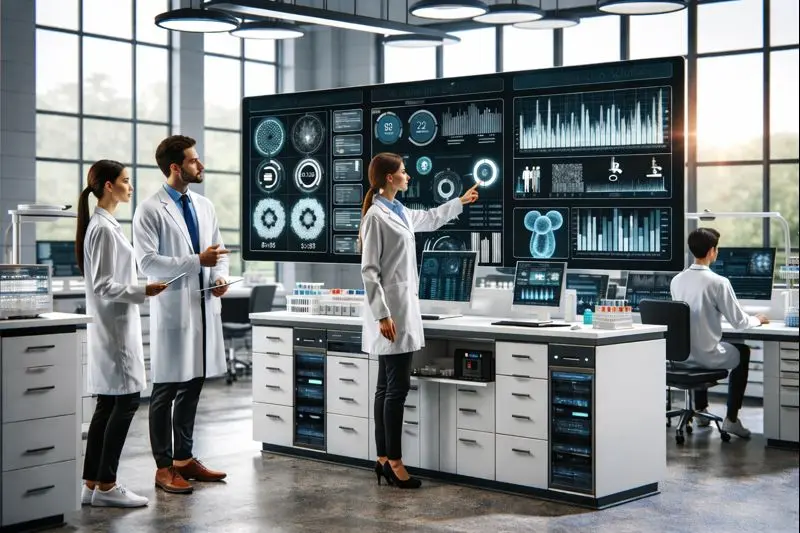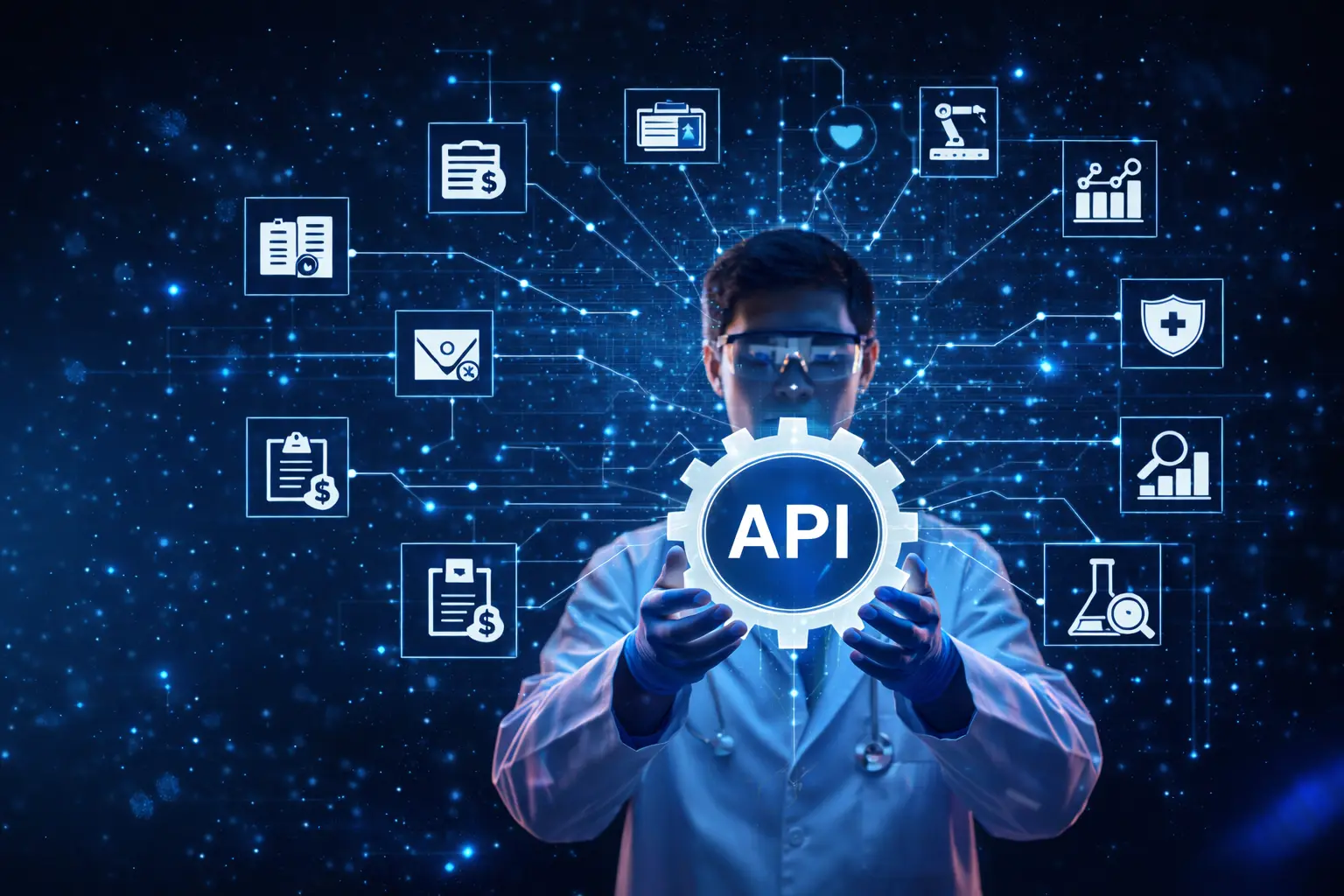Blog
Emerging Technologies of the Future Lab: A Webinar Recap
July 24, 2025
In an era where technology is rapidly transforming healthcare, a recent roundtable discussion brought together industry thought leaders to explore the current state of technology and its potential impact on the future of laboratory science.
The conversation was rich with insights, covering topics from artificial intelligence (AI) in personalized medicine to the shift toward value-based care and the untapped potential of longitudinal data.
The Panelists
Suren Avunjian, CEO of LigoLab Informatics Platform, moderated the roundtable discussion. The panel comprised:
- Bruce Friedman, Professor Emeritus, University of Michigan Medical School
- Stan Schofield, Managing Principal of The Compass Group
- Khosrow R. Shotorbani, President, Executive Director, Project Santa Fe Foundation - Lab 2.0
- Dennis Winsten, President, Dennis Winsten & Associates, Healthcare Systems Consultants
The Digital Transformation of Laboratory Science
The panelists began by acknowledging the digital transformation sweeping various industries, including laboratory medicine.
They emphasized how advancements in artificial intelligence, LIS software automation, and digital pathology solutions have significantly transformed the modern laboratory landscape.
As clinical laboratories grapple with disruptions from technological advancements, regulatory changes, and evolving healthcare landscapes, the panelists emphasized the need for medical labs to be proactive. This includes adopting new technologies, optimizing laboratory workflow management, and investing in staff training and development.
By embracing change and focusing on delivering high-quality, cost-effective services, clinical laboratories and pathology groups can continue to play a vital role in the healthcare ecosystem.
Discover More: Can Your Laboratory Information System Support the Latest LIS System Technology?

The Importance of Laboratory Information System Software Integration
The panelists then explored the complexities of laboratory information systems (pathology lab management software), focusing on the crucial distinction between integration and interfacing.
The discussion shed light on the value of a unified laboratory information system (LIS) in driving greater efficiency, quality, and productivity across lab operations.
LIS System Integration vs. Interfacing: Understanding the Difference
Dennis Winsten emphasized the difference between integration and interfacing. He explained that many people use these terms interchangeably, but they should not.
Interfacing involves the transmission of transactions and messages between disparate laboratory software systems, whereas integration implies all data is contained within a single unified system.
"Lots of times I hear comments about systems being integrated, and in fact, they're not integrated - they're interfaced."
- Dennis Winsten
The Challenges of Lab Information System Interfacing
Lab information system interfacing is prevalent and comes with its own set of challenges.
Modifications between interfaced systems often lead to retesting, downtime, and data remapping, along with potential inconsistencies in how each system displays information. If one system goes offline, it creates uncertainty about data accuracy, redundancy, and which system contains the most up-to-date records.
The Benefits of Lab Information System Integration
On the other hand, lab information system integration offers a comprehensive solution where all data is readily available. This eliminates the silos of financial information, clinical information, and clinical lab data, allowing for real-time access throughout the integration.
LIS system integration ensures that the data used is consistent and unambiguous. It also enhances business intelligence and analytics by allowing them to work across the full spectrum of clinical and financial information, without the need to reconcile disparate information between different laboratory software systems.
Discover More: Why Integrated LIS System and Lab RCM Software is a Catalyst for Growth

AI: The Game Changer in Personalized Medicine
The webinar continued with a robust discussion on the role of artificial intelligence (AI) in personalized medicine.
Discover More: Best Practices for Preparing Medical Labs for AI Integration in Technical and Financial Operations
Bruce Friedman expressed confidence that the lab industry will readily absorb AI.
“I’m confident because laboratory personnel and professionals are very comfortable working with automation and technology, and our industry will provide that for us."
- Bruce Friedman
The panelists highlighted AI's potential to revolutionize healthcare by validating data, predicting diseases, and enhancing the clinical decision-making process.
Ensuring Data Quality with AI
A key point of discussion was the importance of data quality in AI applications.
Winsten stressed the importance of AI operating on accurate and reliable data, cautioning against the "garbage in, garbage out" pitfall.
"Artificial intelligence is not going to solve that if it's dealing with garbage."
- Dennis Winsten
Winsten emphasized the importance of AI in ensuring the validity of data in longitudinal databases, suggesting that it could serve as a quality control officer, identifying inconsistencies in incoming data and ensuring that only high-quality data is used for analysis and decision-making.
Predictive Analytics: A Glimpse into the Future of Patient Care
Winsten took the conversation a step further, envisioning a future where AI, through predictive analytics, could identify potential diseases a patient might develop over time based on their variations within a normal range.
"We've now moved into, with artificial intelligence, a predictive model. This model has enough capability to determine what could happen, and what is likely to happen, based on the analysis of historical data.”
- Dennis Winsten
This perspective paints AI as a crystal ball, providing a glimpse into the future of an individual's health.
But Winsten didn't stop at predictive analytics. He went on to discuss the next evolution in AI: prescriptive analytics.
“With artificial intelligence and machine learning, where the machine learns from the new data it's getting, it can alter what it suggests. Prescriptive suggests decision options that are the most likely to optimize outcomes. It indicates what should happen or the best course of action."
- Dennis Winsten
The Success of AI: A Data-Dependent Story
The discussion underscored a critical point: the success of AI in revolutionizing personalized medicine hinges on the quality of data it operates on.
As Winsten succinctly put it:
“AI is only as good as the data it's going to operate on.”
This statement serves as a reminder that while AI holds immense potential, its effectiveness is intrinsically tied to the quality, accuracy, and reliability of the data it uses.
The Transition to Value-Based Care: A New Era in Healthcare
The conversation then turned toward the future of healthcare, with Stan Schofield bringing up the transition from volume-based to value-based care.
“Contracts are moving from fee-for-service to payments for value, and it's getting traction.”
- Stan Schofield
The panelists concurred that this shift would necessitate significant changes in healthcare, with laboratories playing pivotal roles.
Laboratories: The Bridge to Patients
The panelists urged laboratories to move from their traditional roles and bridge the gap with patients. They emphasized the need for labs to be active and guide patients through the health system efficiently and cost-effectively.
Schofield advised:
"Get closer to the patient - work with your data analytics and financial people doing the contracting."
Understanding Costs and Contracting
The panelists also underscored the importance of labs understanding their costs and working closely with data analytics and financial teams.
They emphasized the importance of having laboratories involved in the negotiation and signing of value-based care contracts.
As Schofield put it:
"No health system should ever sign a value-based care contract without a lab's input."
The Proactive Approach to Value-Based Care
The discussion highlighted the need for medical labs to adopt a proactive approach as they transition to value-based care.
The panelists emphasized that labs must be more than just passive providers of test results; they must be active participants in the healthcare journey, helping to drive patient care and outcomes.
The success of this transition, they emphasized, hinges on labs stepping out of their traditional roles and taking an active role in patient care.
Discover More: Leveraging LigoLab for Optimal Return on LIS Investment: A Guide for Lab Directors

Longitudinal Data: The Power to Predict and Prevent
The power of longitudinal data emerged as a central theme of the webinar.
Khosrow Shotorbani highlighted the value of leveraging longitudinal data as a potential foundation for the future care model.
“This model allows us to do proactive risk stratification even at an asymptomatic stage, which will be required for value-based care."
- Khosrow R. Shotorbani
The panelists discussed the transformative potential of this data, painting a picture of a future where it could serve as a crystal ball, enabling early diagnosis and disease prevention, leading to cost savings and improved patient care.
Shotorbani highlighted the potential of longitudinal data to predict and prevent diseases.
He noted that this data could even be used to diagnose pre-disease states, a concept that could revolutionize healthcare.
"We need to stop talking about just a test and start talking about the change in a test, which is that longitudinal data, even within the normal range."
- Khosrow R. Shotorbani
The Challenge of Retesting Drugs
However, this new approach would not be without its challenges.
Shotorbani pointed out that diagnosing pre-disease states would require retesting drugs for these states, posing a new challenge for the industry.
Medical Laboratories: The Unsung Heroes of Patient Care
The role of medical laboratories in patient care was a recurring topic throughout the webinar.
The panelists emphasized the need for labs to be proactive, understand their costs, and work with data analytics and financial teams.
They painted a picture of labs as unsung heroes in the healthcare system, sitting on a wealth of raw materials that could be harnessed to improve patient care.
“Lab data is the biggest bargain in healthcare today.”
- Bruce Friedman
Labs as Catalysts
Shotorbani highlighted the untapped potential of labs in the healthcare system. He suggested labs could act as catalysts in value-based care, helping to guide patients through the health system efficiently and cost-effectively.
The Unidirectional Nature of Labs
A significant point of discussion was the unidirectional nature of labs. As Friedman explained:
"The lab maintains a one-way connection to patient care. It receives samples, performs tests, and sends out results, but it seldom learns the specific outcomes for those patients."
He further elaborated that this lack of feedback prevents labs from understanding the full impact of their contributions to patient care.
Discover More: Four Game-Changing Business Strategies to Improve Laboratory Processes
Charting the Course for the Future
The webinar concluded with both optimism and anticipation for the future.
The panelists called for continued collaboration and innovation to harness the potential of technology in personalized medicine, to reshape the future of clinical laboratories, and, ultimately, improve patient outcomes.
The insights and connections gained through this roundtable represent a roadmap for the future, a collective effort to navigate the evolving landscape of the clinical laboratory industry. As we continue to explore and innovate, these discussions will be vital in guiding our course.
Looking ahead, the horizon is filled with exciting possibilities.
From the potential of AI and longitudinal data to the pivotal role of labs in patient care, the future of clinical laboratories promises to be a journey of discovery and innovation.
Click HERE to watch the “Emerging Technologies of the Future Lab” webinar on demand.
Discover More: Browse Archived LigoLab Webinars
.jpg)






